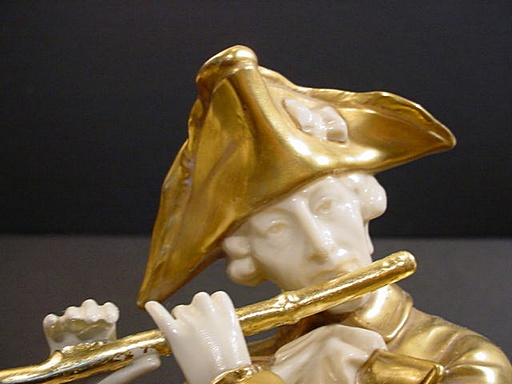Discovered: XXX-y poem by Frederick the Great

More than 200 years after the Prussian monarch's death, a copy of an original poem by Frederick the Great has been discovered, reports Bloomberg News, The Local (Germany's news in English), and The Telegraph. Not just any poem, but an erotic one! Called, no less, "La Jouissance"! Knew that guy was on to something. Writes The Telegraph:
Frederick ruled Prussia until 1772, transforming the country from a minor Germanic kingdom into a European power. But while he was a noted patron of the arts and a keen philosopher, the poem casts new light on a man who ruled at a time when monarchy was shrouded in prudish conservatism.
Vanessa de Senarclens, a teacher of French literature at Humboldt University, unearthed the poem. She told Die Zeit that a copy found its way from Italy to Berlin in 1894 and was quickly put into the royal archive, where it was buried. "It was just a few weeks after he had reluctantly accepted the crown and become king that Friedrich wrote the poem. Dated July 20, 1740, a note accompanying it said it was the only one he had had time to compose since becoming ruler." Frederick also sent the poem to Voltaire, with whom he conferred:
In an accompanying letter, Frederick said it was the only poem he’d had time to write since ascending to the throne. The king also explained that he’d written it for an Italian friend, Francesco Algarotti, who claimed that northern Europeans were less capable of feeling than southerners.
“I have had feelings and described them as best I could to show him that we are capable of sentiment despite our constitution,” Frederick wrote to Voltaire. “Tell me whether my description works or not. Remember that there are moments that are as difficult to describe as the sun in its splendor.”
Frederick appointed Algarotti the romantic hero of his poem, describing a steamy encounter with a woman he names as Chloris, a beautiful virgin of Greek mythology.
The hero is “beside himself with love, trembling with impatience” as he falls into her arms. Frederick describes “kisses dissolving into lust, sighs and death,” and “arising again in a kiss, to become lust once more.”
He concludes by observing that the next morning, it is all over, though “a moment of lust is worth as much to him who enjoys it as a century of honor.”
The poem was not included in a 19th-century publication of Frederick the Great’s verse which encompassed 31 volumes, Die Zeit reported. No one knew then what had become of it.
As Senarcles told Die Zeit: “A poem which praised sexual desire as the ruler of the world was difficult to reconcile with the image of the great commander, high patriotic duty and the ideal Prussian monarch, in a time of deepest national seriousness." The Telegraph notes that "The passion of 'La Jouissance' is also at odds with Frederick's married life. Betrothed to Elisabeth Christine of Brunswick-Wolfenbuttel for political reasons, he never loved his wife, preferring to keep her at arms' length, and the marriage produced no children."
You can read the poem, roughly translated into English, here; in its original langue, here, and in German, hier.


